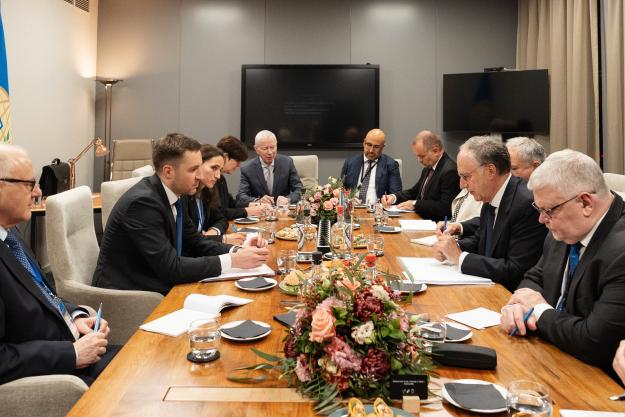
Mr Kirill Lysogorskiy, First Vice-Minister of Industry and Trade of the Russian Federation, and Ambassador Fernando Arias, OPCW Director-General, and their delegations met in the World Forum, in The Hague, the Netherlands, on 24 November 2025.
THE HAGUE, Netherlands—28 November 2025— The OPCW Director-General, Ambassador Fernando Arias, met in The Hague with the Deputy Minister of Industry and Trade of the Russian Federation, Mr Kirill Lysogorsky, on the margins of the Thirtieth Session of the Conference of the States Parties (CSP-30).
The meeting focused on the importance of the Chemical Weapons Convention (CWC) and the commitment of all 193 States Parties to the complete and permanent elimination of chemical weapons. Director-General Arias reaffirmed that all States Parties to the CWC must adhere to their obligations under the Convention and reinforcing the global norm against chemical weapons remains essential for international peace and security.
Director-General Arias outlined the Organisation’s efforts to prevent the re-emergence of chemical weapons, noting that emerging technologies such as artificial intelligence pose both new challenges and opportunities. He emphasised the growing role of the OPCW Centre for Chemistry and Technology in enhancing the Organisation’s capacity to detect, analyse, and respond to potential chemical weapons threats.
“The Russian Federation is fully committed to the global ban on chemical weapons and thanks you, Mr. Fernando Arias, for your efforts in this regard […] It is essential that the Technical Secretariat addresses the all the concerns about the possible non-compliance with the CWC in accordance with its mandate based on impartiality, objectivity and due professionalism. We expect that the OPCW Technical Secretariat will provide a technical assistance visit to Russia in accordance with Article VIII of the CWC,” Deputy Minister Lysogorsky said.
Director-General Arias stated: “We remain ready to cooperate with all States Parties, including the Russian Federation, within the framework of the Convention and in full accordance with our mandate.”
The meeting provided an opportunity for an open exchange of views on challenges related to the Convention’s implementation and the evolving technological and security landscape. Both sides acknowledged the importance of continued engagement to uphold the global norm against chemical weapons.
Background
The OPCW Technical Secretariat has been monitoring the situation on the territory of Ukraine since the start of the war in February 2022 in relation to allegations of use of toxic chemicals as weapons.
In 2025, the Technical Secretariat conducted three Technical Assistance Visits (TAVs) to Ukraine upon Ukraine’s request The reports of all three TAVs confirmed that the samples collected by Ukraine on the battlefield contained the toxic chemical 2-Chlorobenzylidenemalononitrile, known as CS.Both the Russian Federation and Ukraine have accused one another and reported a number of allegations of use of chemical weapons to the Organisation.
A compendium of all official correspondence by States Parties on such allegations and accusations has been made available on the OPCW public website and is regularly updated.
Under the Convention, States Parties have the obligation to declare all toxic chemical agents they hold for riot control purposes. Furthermore, the Convention explicitly prohibits the use of riot control agents as a weapon of war on the battlefield. If used as a method of warfare, these agents are considered chemical weapons and, hence, are prohibited under Article I paragraph 5 of the Convention.
Article II, paragraph 7 of the Chemical Weapons Convention, provides that a Riot Control Agent is defined as any chemical not listed in a Schedule, which can produce rapidly, in humans, sensory irritation or disabling effects which disappear within a short time following termination of exposure.
Article VIII, paragraph 38(e) of the Chemical Weapons Convention states that the Technical Secretariat shall provide technical assistance and technical evaluation to States Parties in the implementation of the provisions of the Convention, including the evaluation of scheduled and unscheduled chemicals.
As the implementing body for the Chemical Weapons Convention, the OPCW, with its 193 Member States, oversees the global endeavour to permanently eliminate chemical weapons. Since the Convention’s entry into force in 1997, it is the most successful disarmament treaty eliminating an entire class of weapons of mass destruction.
In 2023, the OPCW verified that all chemical weapons stockpiles declared by the 193 States Parties to the Chemical Weapons Convention since 1997 — totalling 72,304 metric tonnes of chemical agents — have been irreversibly destroyed under the OPCW’s strict verification regime.
For its extensive efforts in eliminating chemical weapons, the OPCW received the 2013 Nobel Peace Prize.
